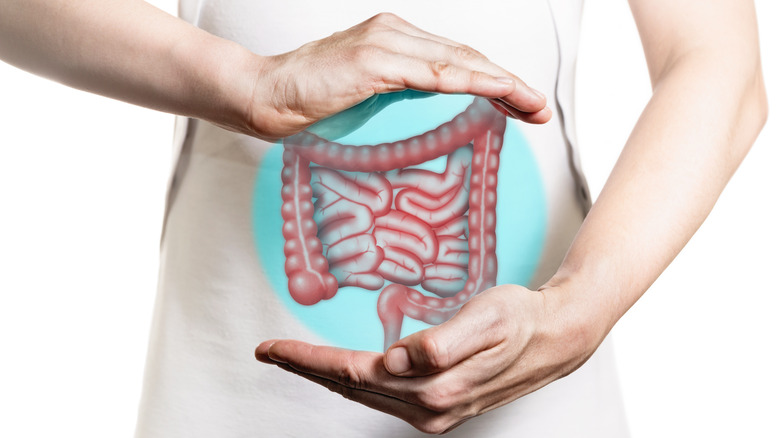When You Should Be Concerned About Hemorrhoids
Hemorrhoids, also called piles, are swollen, enlarged veins that can form inside or outside the anus or rectum. While they're often painless, the walls of these blood vessels can stretch, making the veins bulge, according to WebMD. This can make hemorrhoids irritating and uncomfortable, especially when you poop.
The National Institute of Diabetes and Digestive and Kidney Diseases (NIDDK) states that both men and women can have hemorrhoids, and that about 1 in 20 Americans live with the condition. Even though hemorrhoids can affect anyone, adults older than 50, chronic constipation patients, pregnant people, and those who eat foods low in fiber are at a higher risk.
Healthline states that hemorrhoids are rarely dangerous or fatal. For most people, the discomfort comes mostly from rare painful episodes. However, even the most severe fare-ups can't lead to fatalities. Despite the low threat of hemorrhoids, the American Society of Colon & Rectal Surgeons explains that since there are various types of hemorrhoids, some can lead to blood clots known as thrombosed external hemorrhoids. These clots usually happen in the outer hemorrhoids and can cause unbearable pain, requiring professional help. If you have hemorrhoids, it's always best to speak to your doctor to understand the potential risks and treatment options.
What are the different types of hemorrhoids?
Not all hemorrhoid growths look or feel the same. Healthline outlines four different types of hemorrhoids: internal, external, prolapsed, and thrombosed. Each has its unique characteristics and causes. According to Mayo Clinic, internal hemorrhoids are found inside the rectum, and you usually can't feel or notice them. However, Healthline states that an internal hemorrhoid can grow into a prolapsed type if it swells and sticks out of your anus. Unlike internal hemorrhoids, prolapsed hemorrhoids are easier to identify.
Hemorrhoids become prolapsed due to the consistent weakening of the tissues holding them. Straining during bowel movements can cause this form of weakness in the tissue, per Healthline. The source also states that the effect of smoking on all blood vessels can also be a factor here. Smoking can inflame the veins in your rectum and anus, increasing your risk of hemorrhoids, especially the prolapsed kind.
Obesity can also cause prolapsed hemorrhoids. A 2014 study published in the Korean Journal of Family Medicine established a direct relationship between obesity and hemorrhoids. Obesity can strain the rectal vein, causing hemorrhoids to form and prolapse.
Mayo Clinic further notes that, unlike internal hemorrhoids, external hemorrhoids are painful and may appear under the skin or around the anus. Medical News Today reiterates that external hemorrhoids can develop into a clot known as a thrombus, a more severe hemorrhoid condition.
When to see a doctor
The American Society of Colon and Rectal Surgeons explains that less than 5% of people who get hemorrhoids have symptoms, and even fewer need treatment. The source adds that while many hemorrhoid patients take anal symptoms seriously, diagnosing hemorrhoids requires the help of experienced physicians. According to the NHS, symptoms can include experiencing itches in your anus, feeling like you need to poo after visiting the toilet, and lumps in your anus. Harvard Medical School notes various self-help remedies to manage symptoms. Hemorrhoid prevention options can include eating more fiber to ease constipation, lubricating the defecation process, and sitting in sitz baths. However, it's important to see a doctor if symptoms persist after a week of at-home treatment or if you experience profuse bleeding from the rectum (via Medline Plus).
According to Mayo Clinic, some doctors recommend various over-the-counter hemorrhoid creams, ointments, and suppositories containing hazel and hydrocortisone to help relieve pain and itching. If the condition is serious, surgical procedures vary and include hemorrhoidectomy, stapled hemorrhoidopexy, rubber band ligation, and coagulation, per Healthline.



